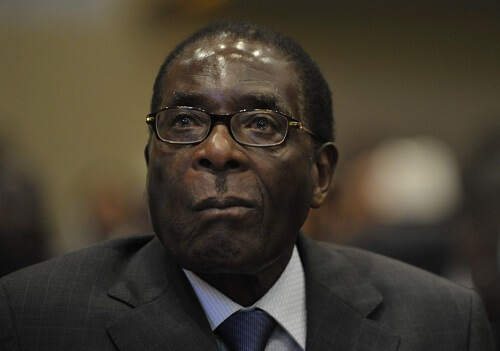Zimbabwe’s former president Robert Mugabe, who stood head and shoulders above other awful African heads of state, has died aged 95. He may have killed more people and caused more deaths through starvation than even that other icon of evil, Idi Amin of Uganda.
When Mugabe became the republic’s first president in 1980, he was celebrated the world over as the face of the new Africa: a leader who would usher in a time of harmony, heal the wounds of war, and who was keen to assure the white minority he had overthrown that all would be well.
Mugabe spoke of the country that he inherited from Britain and the British settlers as kind of jeweled timepiece. He boasted of its sophisticated agriculture, its functional central bank and its vibrant stock exchange.
Initially, Mugabe’s partnership with the old regime appeared to be sincere. I met two white men who ran his security detail at that time who spoke well of him and said they had detected no bitterness. Early warnings, like his takeover of the newspapers, were ignored. To miscreants, the media is always the problem.
I was born and grew up in Rhodesia, as was my father, first known as Southern Rhodesia. I, like my family, wanted to ignore Mugabe’s downside. The period from the granting of independence to Zimbabwe — with the Lancaster House agreements in London — in 1980 to the mid-1990s was promising.
True, my brother was forced from his farm by squatters whom the police refused evict. But even so, he and his wife were remarkably optimistic, if a little apprehensive, when I visited from my perch in Washington in 1996.
Old friends were keen to believe, as were people around the world, that Mugabe was the new face of enlightened Africa. There were signs that pointed to a troubled future, but the people loved their country were loath to believe the worst.
More people worried about the communism Mugabe and his allies in the local university spouted than what was to become vicious and overt racism directed against not just the white settlers but all people of European descent.
For a few years, Zimbabwe remained what it had been before independence: a peaceful place with racial respect, a thriving commercial sector, and farms that were so productive that they represented the regional breadbasket, feeding Zambia and Malawi as well as exporting to South Africa.
Some trace Mugabe’s descent into dictatorial insanity to the release of Nelson Mandela from detention in South Africa and Mandela’s usurpation of Mugabe as the darling figure in the capitals of the world. There was a sexual overlay as well.
Both Mugabe and Mandela sought the hand of Graca Machel, the widow of Mozambican President Samora Machel, in marriage. Mandela carried off the damsel, and Mugabe’s descent accelerated.
Mugabe seized the primarily white-owned farms, played games with the citizenship of people he didn’t like; rigged elections; used violence against political opponents; and ordered, or condoned, the security forces, in violation court orders, to beat and intimidate anyone who opposed him.
He began to espouse a kind of paranoid racism, where everything that was wrong was because of the colonialism and the evils of the white population. It was always someone else’s fault.
In the end, Mugabe smashed his jeweled-timepiece nation. The currency failed when inflation ran into the millions of percent and today, over two years since Mugabe fell, Zimbabwe still has no currency. Under the new president, Emmerson Mnangagwa, it continues to be beset with poverty and famine.
This is the message of Mugabe: Failure to stop the tendencies of those who get away with small constitutional infringements will lead to their getting away with massive wrongdoing.
Part of the dictator’s path is to buttress support by denigrating a particular group, then persecuting that group.
Mugabe started by sending his dreaded Fifth Brigade into the south of the country, where he killed an estimated 25,000 of the Ndebele people who had supported the opposition party and fought colonialism separately under their leader Joshua Nkomo.
Then it was on to seizing white property, white passports, and in the end driving out the commercial class. Hardly a Rhodesian remains in what was Rhodesia.
There are those who shrug at governmental transgression in the belief that the pendulum will swing back. Maybe, but not if it has broken the clock and is on the floor. That is the lesson of Robert Mugabe and the tragedy of the land of my birth.

 Follow
Follow
Thank you for your insights. Excellent column!